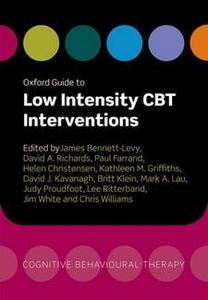Low intensity CBT with indigenous consumers: creative solutions for culturally appropriate mental health care
Laliberté, Arlene, Nagel, Tricia, and Haswell, Melissa (2010) Low intensity CBT with indigenous consumers: creative solutions for culturally appropriate mental health care. In: Bennet-Levy, James, Richards, David A., Farrand, Paul, Christensen, Helen, Griffiths, Kathleen M., Kavanagh, David J., Klein, Britt, Lau, Mark A., Proudfoot, Judy, Ritterband, Lee, White, Jim, and Williams, Chris, (eds.) Oxford Guide to Low Intensity CBT Interventions. Oxford Guides in Cognitive Behavioural Therapy . Oxford University Press, Oxford, UK, pp. 577-585.
![[img]](https://researchonline.jcu.edu.au/16521/8.hassmallThumbnailVersion/16521_Laliberte_et_al_2010_Book_Cover.jpg)
|
Image (JPEG) (Book Cover)
- Cover Image
Download (12kB) |
|
|
PDF (Published Version)
- Published Version
Restricted to Repository staff only |
Abstract
Few clinicians would argue that cross-cultural settings present additional challenges to assist people experiencing mental health problems. Rarely are settings more challenging than those faced by non-indigenous clinicians working with indigenous consumers in countries, such as Australia, Canada, USA, and New Zealand. Not only are there major differences in world views, life experience, and ways of interacting between cultures, there are also severe issues impacting on Indigenous mental health associated with 'fourth world' status.
In Australia, health disparities between Aboriginal and non-Aboriginal people are widely known, with death rates over three times higher. This enormous burden of loss and grief, compounded by past and present loss of culture, land, and tradition are recurring themes underpinning Indigenous mental health disparities in the published literature (Ypinazar et al. 2007).
Indigenous communities experience high levels of distress, psychiatric hospital admissions and co-morbidity. These present earlier in life, are multiple and mutually reinforcing, recurrent and persistent and are less likely to he offset by protective factors, or be seen as abnormal or amenable to treatment (Haswell-Elkins et al. 2007).
The context of social disadvantage and psychological trauma that is secondary to colonization and cultural difference leads to complex presentations (Nagel and Thompson 2008). Despite the urgency to implement effective interventions, little evidence exists to guide clinicians in their choice of treatment. One exception is evidence of the effectiveness of brief interventions in substance misuse of Indigenous clients that is emerging (Anderson 2007). However, progress is relatively slow, as researchers confront the same challenges as clinicians: namely, the need to balance methodological rigour with both flexibility and cultural sensitivity.
This chapter outlines challenges faced by clinicians and provides a guide to embed key understandings that have emerged from recent research into practice. We present a series of principles guiding 'ways of being', which may assist clinicians achieve optimum outcomes with their clients; and we propose a framework for enhancing specific LI CBT interventions to increase cultural sensitivity and appropriateness, and to overcome limitations of classical CBT interventions. An example of a therapeutic approach adapted for Indigenous clients is then provided to guide 'ways of doing'. The approach employs a strengths-based focus on goal setting, problem-solving, and home practice, in the best tradition of CBT.
| Item ID: | 16521 |
|---|---|
| Item Type: | Book Chapter (Research - B1) |
| ISBN: | 978-0-19-959011-7 |
| Date Deposited: | 18 May 2011 06:04 |
| FoR Codes: | 11 MEDICAL AND HEALTH SCIENCES > 1117 Public Health and Health Services > 111714 Mental Health @ 50% 11 MEDICAL AND HEALTH SCIENCES > 1117 Public Health and Health Services > 111701 Aboriginal and Torres Strait Islander Health @ 50% |
| SEO Codes: | 92 HEALTH > 9203 Indigenous Health > 920302 Aboriginal and Torres Strait Islander Health - Health Status and Outcomes @ 50% 92 HEALTH > 9204 Public Health (excl. Specific Population Health) > 920410 Mental Health @ 50% |
| Downloads: |
Total: 1385 Last 12 Months: 7 |
| More Statistics |



